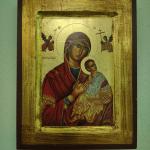I swallowed nervously knowing what my next question would produce. We were studying Luke’s version of the Beatitudes. I asked the question. “What does this mean?” Then he looked at his disciples and said: “Blessed are you who are poor, for yours is the Kingdom of God.” (Luke 6:20)
One of the wealthier businessmen in the class answered, “That means poor in spirit.”
“Does it?” I asked. “But verse 24 would mean something other than what it says.” But woe to you who are rich, for you have received your consolation. “That would make this mean a woe is pronounced people who are rich in spirit. It does not make any sense.” Unfortunately, the discussion did not end there. The phone rang on Monday morning.
The Difference A Few Words Make
The person calling me wanted to clarify the matter. It was not the same person mentioned above. Rather, it was someone who usually called to clarify matters on Mondays. He was not a bad person. The guy was just that person who calls on Monday mornings about something said in sermons or studies.
“I don’t believe Jesus was talking about those lazy welfare cheaters.” Having had relatives who received government aid, I did not say the first thing that popped into my head. I demurred about how Luke said Jesus was addressing his disciples. But I included that did not change the words in the text of Luke. Jesus blessed the poor and condemned the wealthy.
Still he persisted about people being poor because they did not want to work. Yes, I agreed there were people fitting into that category. I suspected then and now there were not that many though.
There was something special to these men about those two little words, in spirit. The beatitudes became different for them then. They let them off the hook concerning the poor. In the southeastern United States, middle class white people continue having the image of criminality and poverty as being the special qualities of people of color. I remember the minister of my home congregation claiming the beatitudes said, “Blessed are the peacemakers not the peace lovers.” I am now older than he was when he said that. And I still can’t figure out what that was supposed to mean.
The Beatitudes in Thomas
Did Matthew give them this way out? Did the author spiritualize the beatitudes to make them more palatable? Or do interpreters do it? What is really important is to know that the idea of listing the Beatitudes is something Matthew and Luke do. Mark and John say nothing of them. But we know these sayings of Jesus were known by the members of the early church.
The gospel of Thomas does not contain a list of the Beatitudes. But, Luke’s beatitudes are in it. The following numbers are from the translation of Marvin Meyer.
54. Jesus said, ‘Blessed are the poor: yours is the kingdom of heaven.’
58. Jesus said, ‘Blessed is the one who has suffered (I take this as the same as those who weep or mourn): that one has found life’
68-69 Jesus said, ‘Blessed are you when you are hated and persecuted, and no one will discover the place where you have been persecuted.’ Jesus said, ‘Blessed are those who have been persecuted in their hearts: they truly know the Father. Blessed are those who are hungry, for the stomach of the famished will be filled.’
The hungry do not hunger for righteousness. The poor are not poor in spirit. Thomas gives some interesting spiritualization to being hated and persecuted. But those who suffer find life which could include laughter or comfort.
The Church and The Beatitudes
The Beatitudes are among many sayings attributed to Jesus. The sermons on the mount and the plain are collections of these sayings. The church did not invent them. But the church made them a list of special virtues for a concrete spirituality. Matthew did not “spiritualize” them. The list in Matthew expands on the list found in Luke and agreed to by Thomas.
Hungry people need food. Often they do not have it because of injustice. Therefore those who hunger and thirst need justice so they no longer suffer. The same is said concerning poverty. Poor people have their spirits crushed by chronic poverty. They will receive the kingdom of God. Luke gives us what we see. Matthew gives us reasons to look beyond what we see. Dom Helder Camara said, “When I give food to the poor, they call me a saint. When I ask why they are poor, they call me a communist.”
The minister who spoke of “peace lovers” was good at dog-whistling. I suspect he was targeting the hippie commie peaceniks and anti-segregationists that were despised by white southerners. Softening the beatitudes by denigrating people who tried to exhibit them created the whiplash effect many of us have. Interpreters who attempt to overcome this may mistake what the Biblical writers are doing and forget the people who spoke well of false prophets were religious people.












